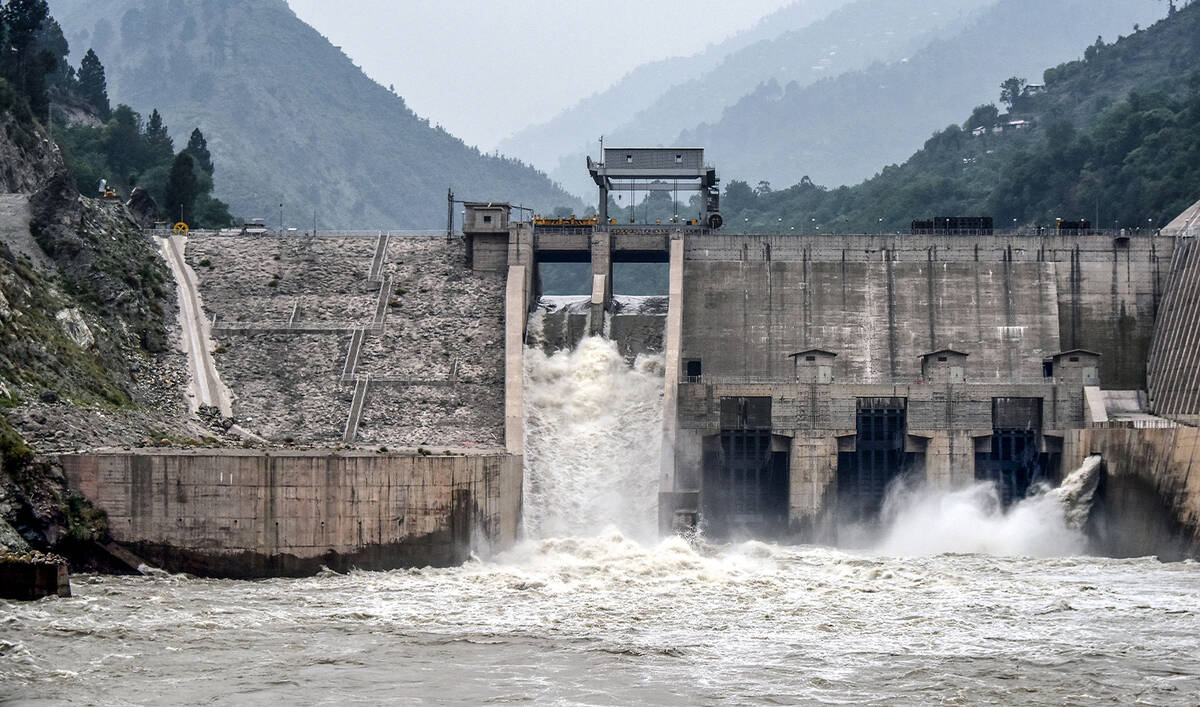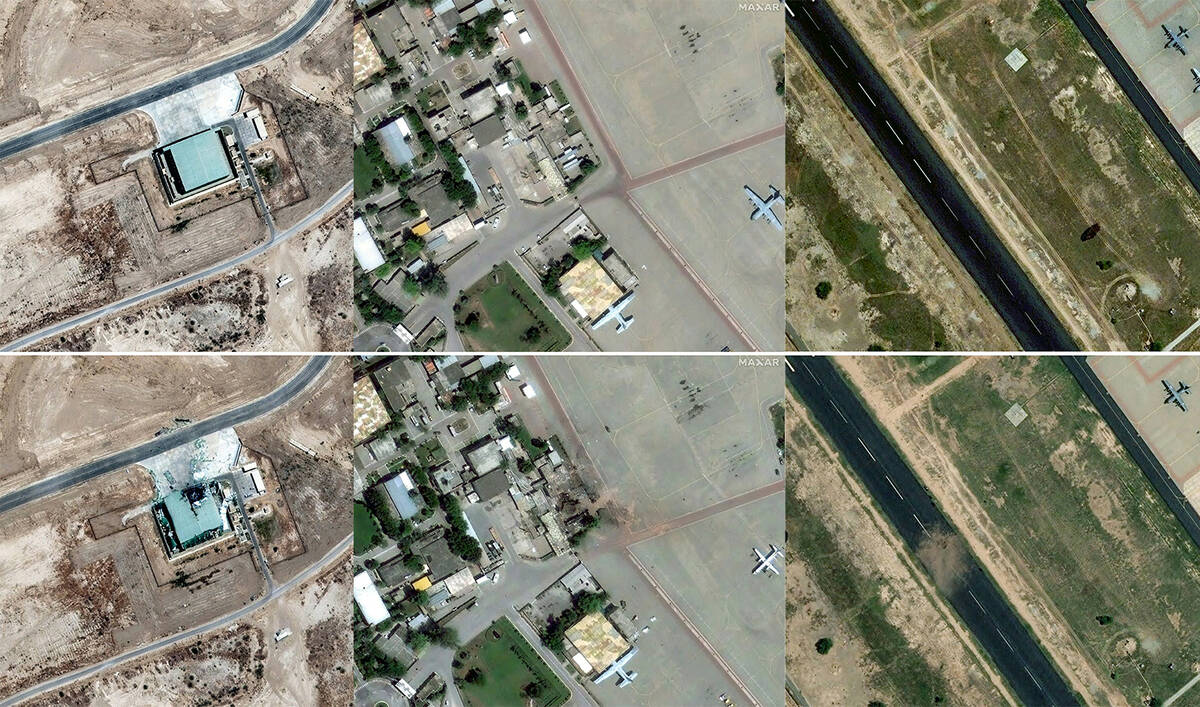ISLAMABAD: Asif Ali Zardari, the widower of Pakistan’s slain first female premier Benazir Bhutto who has had a life storied equally by tragedy and farce, is set to become president for a second time on Saturday.
Initially a background character as Bhutto’s consort, Zardari was stained by a bevy of corruption and other allegations, including absurd kidnapping plots and taking kickbacks lavished on hoards of jewelry.
Despite a reputation as “Mr. Ten Percent” — the alleged cut he took for rubber-stamping contracts — a sympathy vote propelled him to office when his wife was assassinated in a 2007 bomb and gun attack.
Between 2008 and 2013, he ushered in constitutional reforms rolling back presidential powers, and the 68-year-old’s second term will see him steer a largely ceremonial office.
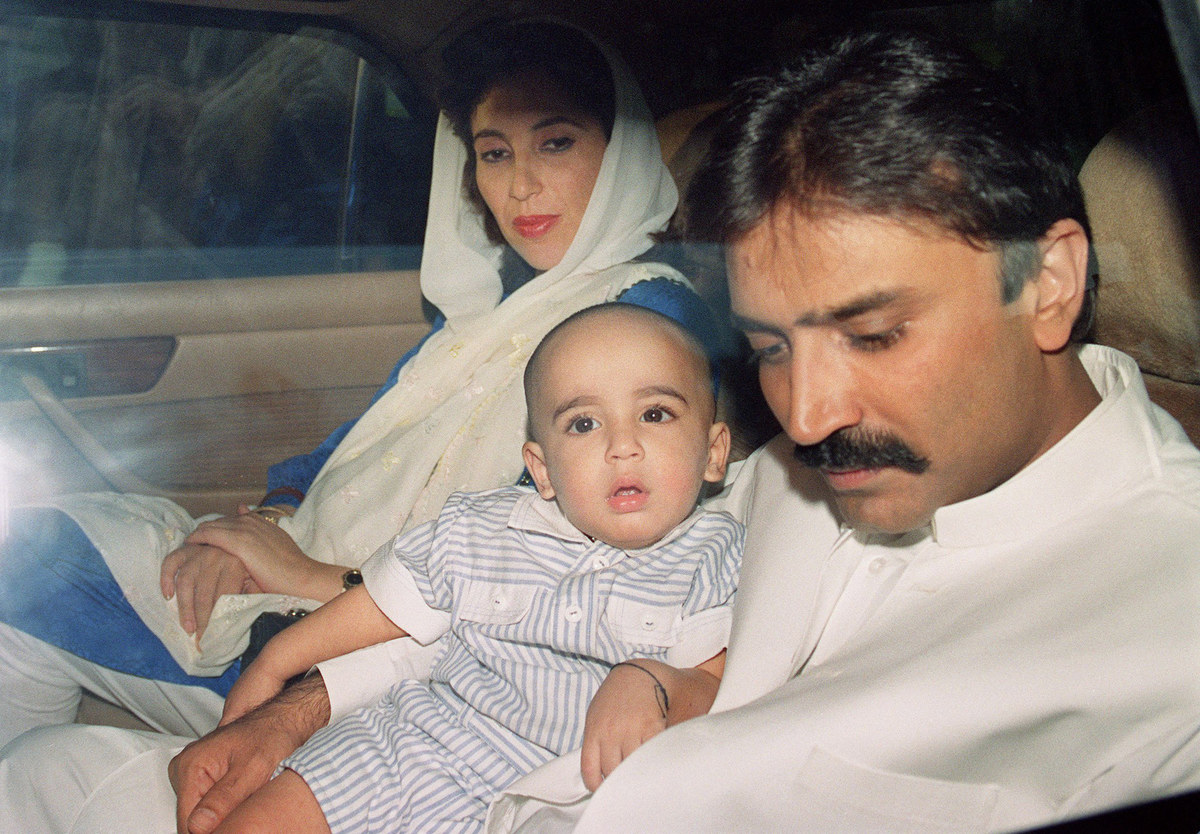
Former Pakistani Prime Minister Benazir Bhutto (L) rests inside the presidential car with husband Asif Ali Zardari cuddling their baby son Bilawal shortly after their arrival in Kuala Lumpur on October 17, 1989 to attend the Commonwealth Heads of Government Meeting.
He has spent more than 11 years in jail, a long time even by the standards of Pakistani politicians, with a wheeler-dealer’s talent for bouncing back after scandals.
Back in 2009, the New York Times said he had a knack for “artful dodging” — “maneuvering himself out of the tight spots he gets himself into.”
Newly sworn-in lawmakers were set to vote him in under the terms of a coalition deal brokered after February 8 elections marred by rigging claims.
Under that deal, Zardari’s Pakistan Peoples Party (PPP) will take the presidency, while its historic rivals the Pakistan Muslim League-Nawaz (PML-N) party secured the prime minister’s position for Shehbaz Sharif, who was officially sworn in on Monday.
Zardari was born in 1955 into a land-owning family from the southern province of Sindh.
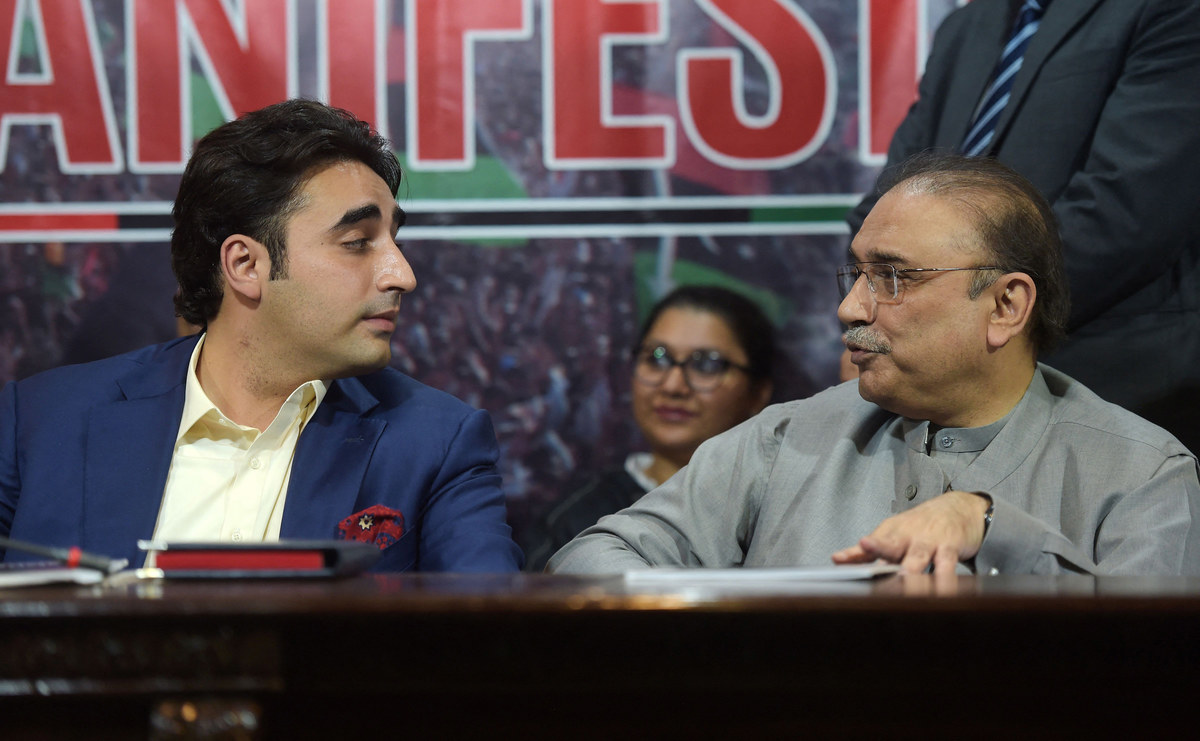
Chairman of the Pakistan Peoples Party (PPP) Bilawal Bhutto Zardari (L) chats with his father and Pakistan's former president Asif Ali Zardari (R) prior to presenting their party manifesto for the forthcoming general election during a press conference in Islamabad on June 28, 2018. (AFP/File)
“As a child, I was spoilt by my parents as an only son,” he said in a 2000 interview with the Guardian newspaper. “They indulged my every whim.”
He expressed only limited political ambitions as a young man — losing a 1983 local government election.
It was his 1987 arranged marriage with PPP leader Benazir Bhutto that earned him a spot in the political limelight.
Their union — brokered by Bhutto’s mother — was considered an unlikely pairing for a leader-in-waiting from one of Pakistan’s major political dynasties.
Bhutto was an Oxford and Harvard graduate driven by the desire to oust then-president Mohammad Zia-ul-Haq, who forced her father from the prime minister’s office and had him executed.
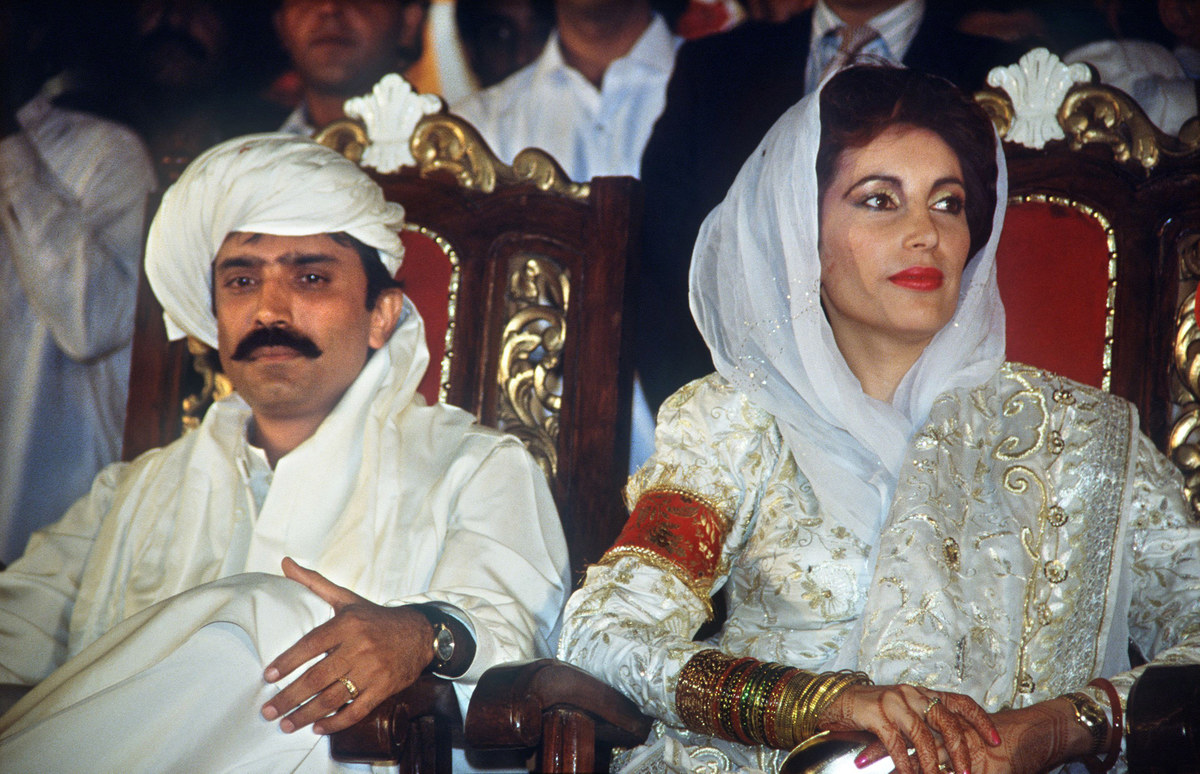
Pakistani People's Party (PPP) leader, Benazir Bhutto (R) is seen during her wedding where she is getting married to Asif Ali Zardari in Karachi December 18, 1987. (AFP/File)
Zardari was a university dropout with a reputation for brawling, partying and romancing women at a private disco in his family home.
On the eve of their wedding, Bhutto’s team issued a formal statement denying he was “a playboy who plays polo by day and frequents discos at night.”
Their nuptial celebrations were dubbed the “people’s wedding” — doubling as a political rally in the megacity of Karachi, where a crowd of 100,000 fervently chanted PPP slogans.
Initially, Zardari pledged to keep out of politics.
Bhutto served as prime minister from 1988 to 1990 — the first woman to head a democratic government in a Muslim country — and again from 1993 to 1996.
PPP insiders regarded Zardari as a liability, considering him likely to embarrass her leadership.
Their fears were perhaps well-founded. In 1990, he was embroiled in accusations of an absurd plot to extort a businessman by tying a bomb to his leg.
He was jailed for three years on extortion and kidnapping charges but was elected to the national assembly from behind bars.
In Bhutto’s second term, he served as investment minister.
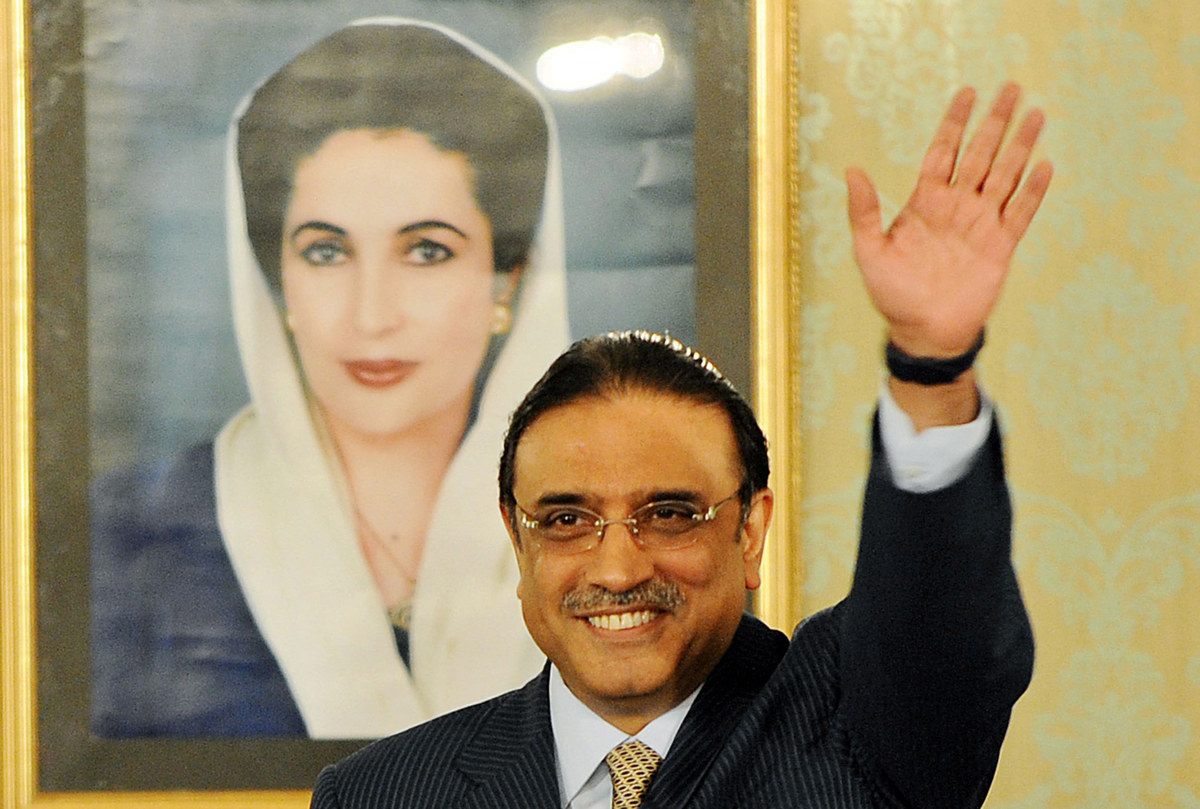
Pakistan's new President Asif Ali Zardari stands in front of a portrait of his slain wife Benazir Bhutto and waves as he arrives for a joint press conference at The Presidential Palace in Islamabad on September 9, 2008. (AFP/File)
A bombshell New York Times investigation detailed how he tried to engineer vast kickbacks on military contracts over this period while lavishing huge sums on jewelry.
After Bhutto’s government fell in 1996, Zardari was back behind bars within half an hour.
In December 2007, Bhutto was assassinated while on the campaign trail for a third term in office.
Her killing shook the nation to its core, a wave of sympathy carrying the PPP to victory in 2008. The party nominated Zardari as president.
In 2010, he was widely criticized for continuing a European holiday when the nation was devastated by floods that killed almost 1,800 and affected 21 million.
He was also head of state when US commandos trespassed onto Pakistani soil for the 2011 assassination of Osama Bin Laden, an episode that humiliated many compatriots.
He did, however, usher in constitutional reforms rolling back the sweeping powers of the presidency and bolstering parliamentary democracy that had been undermined by three decades of military rule since 1947.
In 2013, Zardari became the first Pakistani president to complete his full term.
He was jailed once again over money laundering charges in 2019 but was released months later.
Zardari and Benazir had three children, including Bilawal Bhutto Zardari, the current chairman of the PPP.




